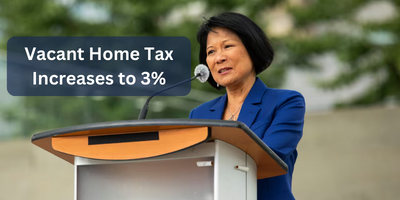Toronto Vacant Home Tax
In an ambitious attempt to address Toronto’s housing affordability crisis, the city has introduced the Toronto Vacant Home Tax, a measure that is poised to shift dynamics in the Toronto real estate market. Targeting unoccupied residential properties, the tax seeks to incentivize homeowners to add their empty homes to the rental market, thereby increasing the housing supply and potentially easing rental costs. This article outlines the details of the Toronto Vacant Home Tax, examining its implications for various stakeholders in the real estate industry, and offering insight into what property owners can anticipate. Unpack the potential impact of this legislation on both buyers and sellers, understand the exceptions, and navigate the evolving landscape of Toronto’s real estate market with confidence.
What is the Toronto Vacant Home Tax?
Let’s first understand the nature and purpose of the Toronto Vacant Home Tax. Initiated this year by the City of Toronto with a tax filing deadline of February 28, 2023, this new tax measure primarily targets the burgeoning issue of housing affordability. Its primary goal is to prompt homeowners with vacant properties to either occupy them, rent them out, or put them on the market for sale. The Vacant Home Tax applies to all residential properties that are unoccupied for over six months within a calendar year, with a handful of exceptions. The introduction of the Toronto Hme Tax has stirred significant conversations in the real estate market, making it a focal point of discussions among buyers, sellers, and investors alike.
How much is the Vacant Tax Penalty?
Property owners should expect to pay a tax of one percent (1.00%) of the property’s assessed value for each year the property stays vacant for more than six months.
Understanding Property Assessment Value
The assessed value of a property in Ontario is determined by the Municipal Property Assessment Corporation (MPAC). Every four years, MPAC performs an Assessment Update and issues a Property Assessment Notice to property owners. This notice provides the Current Value Assessment (CVA), an estimate of what the property could have sold for on a specific date.
For instance, if a property’s CVA rose from $592,000 to $770,000 between 2016 and 2020, the $178,000 increase is divided by 4, giving an annual phased-in increase of $44,500. Thus, the CVA used for taxation purposes incrementally rises over four years, while any decreases in value are applied immediately.
This assessed value is used to calculate property taxes, including the Vacant Tax Penalty. If a property is vacant for over six months, owners pay a tax of 1% of the assessed value each year. Details of the impact of these assessments are included in the Final Tax bill.
Implications for both purchasers and vendors:
The introduction of the Toronto Vacant Home Tax brings new responsibilities and potential financial implications for both purchasers and vendors in property transactions:
- Declaration Responsibility: Both purchasers and vendors are responsible for ensuring the property status declaration has been filed. Vendors must complete the declaration prior to closing if the transaction occurs between January 1 and February 2, while purchasers must submit a declaration in the subsequent year if the closing occurs between February 3 and December 31.
- Lien on Property: The Vacant Home Tax forms a lien on the property. Unpaid taxes will become the purchaser’s responsibility post-transaction, underlining the importance of confirming the tax status before closing.
- “Transfer of Legal Ownership” Exemption: Purchasers qualify for this exemption if the closing occurs after the declaration period, although they still must submit a property status declaration in the following year.
- Vendor Documentation: Vendors should provide purchasers with two critical documents at closing: a copy of the completed and filed property status declaration, and a statutory declaration affirming the truthfulness of the property status declaration.
- Market Dynamics: The Vacant Home Tax may influence the behaviour of vendors and purchasers. Vendors facing potential tax implications might opt to sell or rent their properties sooner, affecting the supply of properties on the market. Conversely, purchasers may use this tax as negotiation leverage, especially with vendors looking to avoid the tax.
- Investor Considerations: For purchasers, especially real estate investors, the Vacant Home Tax might influence the profitability of properties intended for long-term appreciation. They must consider the future tax implications if they plan to leave the property vacant.
How to protect yourself as a buyer:
In this evolving landscape, buyers must tread carefully. One crucial factor to consider is verifying the occupancy status of the property they intend to purchase. If a property has been vacant for a considerable portion of the year, the buyer could potentially bear the burden of the Vacant Home Tax.
Obtaining legal advice is an invaluable step in these circumstances. The Nazarian Law team can guide buyers through the intricacies of the purchase agreement, emphasizing the terms related to the Vacant Home Tax. Furthermore, buyers might want to negotiate protective clauses that shield them from liabilities arising from the previous owner’s use or misuse of the property or undeclared tax filings. It would be prudent for buyers to insert these protective clauses within the Agreement of Purchase and Sale whereby the Vendor explicitly represents that the Toronto Home Vacant Tax has been declared on time together with an undertaking to provide the declaration on or before closing.
How can I file the declaration to the Toronto Vacant Home Tax?
In an effort to support homeowners through this change, the City of Toronto plans to offer a Vacant Home Tax online self-reporting tool. Property owners can utilize this tool to report the status of their properties. Moreover, owners should be prepared for audits and inspections designed to verify the information reported, which emphasizes the need for accurate record-keeping.
Exemptions to the Toronto Vacant Home Tax:
- Death of a Registered Owner: If a property was left vacant for six months or more in the previous year due to the death of an owner, it will not be subject to the Vacant Home Tax.
- Repairs or Renovations: Properties undergoing repairs or renovations can be exempted from the tax if all of the following conditions are met: the repairs or renovations prevent occupation and normal use; all necessary permits for the work have been issued; and the city’s Chief Building Official concludes that the work is being carried out actively without unnecessary delay.
- Principal Resident is in Care: If the principal resident of a property has been in a hospital, long-term, or supportive care facility for at least six months during the taxation year, the property may be exempted from the tax. This exemption can be claimed for up to two consecutive taxation years.
- Transfer of Legal Ownership: If you purchased your property within the taxation year being declared, and there was a 100% transfer of interest to an unrelated individual or corporation, the property may be exempt from the tax. This does not include name changes, adding a second owner, or removing a second owner.
- Occupancy for Full-Time Employment: If the owner who has a principal residence outside of the Greater Toronto Area requires the property for occupation for employment purposes for at least six months in the taxation year, the property may be exempt from the tax
- Court Order: If there is a court order in effect prohibiting occupancy of the property for at least six months during the taxation year, the property may be exempt from the tax.
Methods for Paying the Toronto Vacant Home Tax:
The Vacant Home Tax is due in three installments on May 1, June 1, and July 4, 2023. Here are the primary ways to make your payments:
- MyToronto Pay: This service, in partnership with PayIt, allows payments through electronic funds transfer without fees, or with a fee via credit or debit card.
- Financial Institutions: Make payments through online banking, telephone, ATMs, or in-person. You need your 21-digit assessment roll number from your Vacant Home Tax Notice and the appropriate payee listing (e.g., “Toronto, City of, Taxes” for BMO, “Toronto Tax” for CIBC, etc.).
- Mail-In Payment: Send post-dated cheques payable to the Treasurer, City of Toronto to Box 5000, Toronto, ON M2N 5V1.
- City Payment Counters: Payments can be made at the City’s Property Tax and Utilities Inquiry & Payment Counters via multiple payment methods, or via cheque or money order through drop boxes.
Consequences for Late Payments and Tax Declarations:
The Vacant Home Tax by-law imposes penalties for late payments, declarations, and other offences.
- Late Payments and Interest: Overdue payments attract a monthly interest rate of 1.25%. In case of default, the unpaid amount gets added to the residential property’s tax roll, collected like property taxes. Additionally, dishonoured payments incur a processing fee.
- Late Declarations: Failing to declare your property’s occupancy status by February 28, 2023, could lead to a $250 fine. In such cases, your property will be considered vacant, and you will receive a Vacancy Tax Notice.
- Offences and Fines: Offences related to declarations and evasion of tax result in fines between $250 and $10,000 per offence. Understanding and complying with the Vacant Home Tax requirements can help avoid these penalties.
The Role of a Real Estate Lawyer in Toronto
The Nazarian Law team can assist in understanding and applying for exemptions, reviewing and drafting purchase agreements, and providing advice on potential legal scenarios. We can also help buyers negotiate protective clauses and sellers in understanding the potential implications of the tax on the sale or lease of their property.
When representing a real estate purchase client for properties within the City of Toronto, our real estate lawyer would requisition for the status of the Toronto Vacant Home Tax thereby demanding a copy from the vendor’s solicitors prior to closing. The deadline for this is stipulated in the Agreement of Purchase and Sale under the section “Title Search”.
When representing a real estate sale client for properties within the City of Toronto, our real estate lawyer would be requesting a copy of the declaration as soon as possible to avoid complications upon closing. Should the tax filing not be declared we would advise you to remedy the situation urgently to avoid delays in your closing.
Conclusion
The introduction of the Vacant Home Tax is a bold move by the City of Toronto to address its ongoing housing affordability crisis. The tax’s impacts extend to vendors, purchasers, and property owners alike, adding another layer of complexity to the city’s already dynamic real estate market. As a purchaser, vendor, or property owner, it is crucial to understand the tax and its implications, ideally with the guidance of Nazarian Law. With the right knowledge and preparation, stakeholders can effectively navigate this new policy and, perhaps, even find new opportunities amidst the changes.
It is yet to be seen how the introduction of this new tax policy will achieve its intended purpose.
————————————-
Disclaimer
The content provided in this article or blog is for informational purposes only. It is not intended to constitute legal advice or to replace the advice of a qualified legal professional. While we strive to provide accurate and current information, the law is complex and constantly changing, and each person’s circumstances are unique. Therefore, you should not rely on this information as a substitute for professional legal advice. This information does not create an attorney-client relationship between you and our law firm. We strongly recommend that you consult with a qualified attorney in your jurisdiction to understand your legal rights and obligations. Always seek legal advice before making any decisions that may impact your legal rights or obligations.




